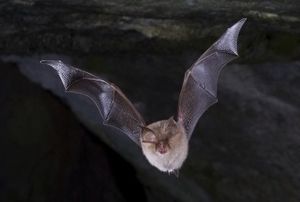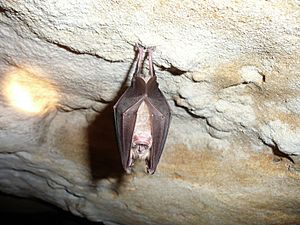Devil's Chapel Scowles facts for kids
| Site of Special Scientific Interest | |
| Area of Search | Gloucestershire |
|---|---|
| Coordinates | 51°44′18″N 2°34′17″W / 51.738266°N 2.571262°W |
| Interest | Biological |
| Area | 44.79 hectare |
| Notification | 1998 |
Devil's Chapel Scowles is a very special natural area in Gloucestershire, England. It covers about 44.79 hectares. This site was officially recognized in 1998 because of its important wildlife. It is located in the beautiful Forest of Dean. This area is carefully looked after by Natural England.
What are Scowles?
Scowle is an old name for certain rocky areas found in the Forest of Dean. These unique places are important to local history and stories. Scowles look like pits, holes, and other features in the ground. They are often found where iron ore is present.
Many people used to think these holes were made by humans digging for iron. However, scowles are actually formed by natural geological processes. They are not man-made.
Scowles are full of amazing wildlife. Because these areas have been disturbed very little, they are great for nature. You can find different types of habitats here. These include rare limestone grasslands and acid heathlands. Protecting these habitats is a top priority in Gloucestershire.
Most importantly, scowle areas are home to endangered bat species. These bats use the deeper mine tunnels, which can be reached through the scowle formations. They hibernate there during the colder months.
Home to Special Bats
Devil's Chapel Scowles is one of several special sites in the Forest of Dean. These sites are important for two types of bats: the Lesser horseshoe bat and the Greater horseshoe bat. These bats are very important across Europe. The sites provide places for them to breed and to hibernate in winter.
Other important bat sites in Gloucestershire include breeding places like Blaisdon Hall. There are also hibernation sites such as Buckshraft Mine & Bradley Hill Railway Tunnel. All these places work together to protect the bats.
The Forest of Dean and the Wye Valley have many leafy woodlands. They also have sheltered valleys. These areas are perfect for bats to find food. The underground cave and mine systems provide safe places for bats to roost and raise their young.
 | Bayard Rustin |
 | Jeannette Carter |
 | Jeremiah A. Brown |



